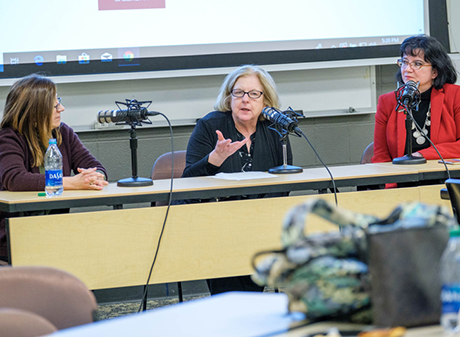A Way to Influence Public Policy

University of Missouri-St. Louis Economics Professor Lea-Rachel Kosnik (left) and then-UMSL Associate Provost for Academic Affairs Marie Mora (right) are interviewed by St. Louis Fed Assistant Vice President and Economic Education Officer Mary Suiter (center).
Marie Mora, who was recently promoted to provost and executive vice chancellor for academic affairs at the University of Missouri-St. Louis, and Lea-Rachel Kosnik, economics professor at UMSL, have something in common—both were drawn to the field of economics because of its policymaking aspect.
In a Women in Economics Podcast Series episode, the two women spoke about their experiences in the field of economics and their roles at the university. Mora has focused on diversity and equity issues in academia. One of the things that got her interested in economics in the first place was her desire to increase diversity and inclusion in the field, which she has been involved in throughout her entire career.
Diversity is extremely important because a lot of economic research done in an academic environment affects policy, she noted.
“If we have policy that's being driven by let's say members from a particular group that ... has excluded representation from society at large, then we are making policy decisions that have implications for everybody from the voices of just a few,” she said.
“If we are driving policy based on imperfect information, we may not get the best policy for all,” Mora continued.
Kosnik found economics to be a good fit because she enjoyed math but didn’t want to study subjects like engineering, accounting and physics.
“I took an economics class and realized there was a public policy aspect to it,” Kosnik said. “And when you bring in a public policy aspect that has to do with people and their lives and I could still do math, then it was a good fit.”
She agreed with Mora that having diverse perspectives at the policymaking table is essential, emphasizing that it is important to have diverse researchers doing the research behind the policies.
“There's a lot of research areas that were not studied, I believe, because there weren't women to study them who maybe had the perspective on them,” she said.
Additional Resources
- Women in Economics: Marie Mora and Lea-Rachel Kosnik
- On the Economy: Seeking and Giving Advice
- On the Economy: From Academia to the Federal Reserve
This blog offers commentary, analysis and data from our economists and experts. Views expressed are not necessarily those of the St. Louis Fed or Federal Reserve System.
Email Us
All other blog-related questions

